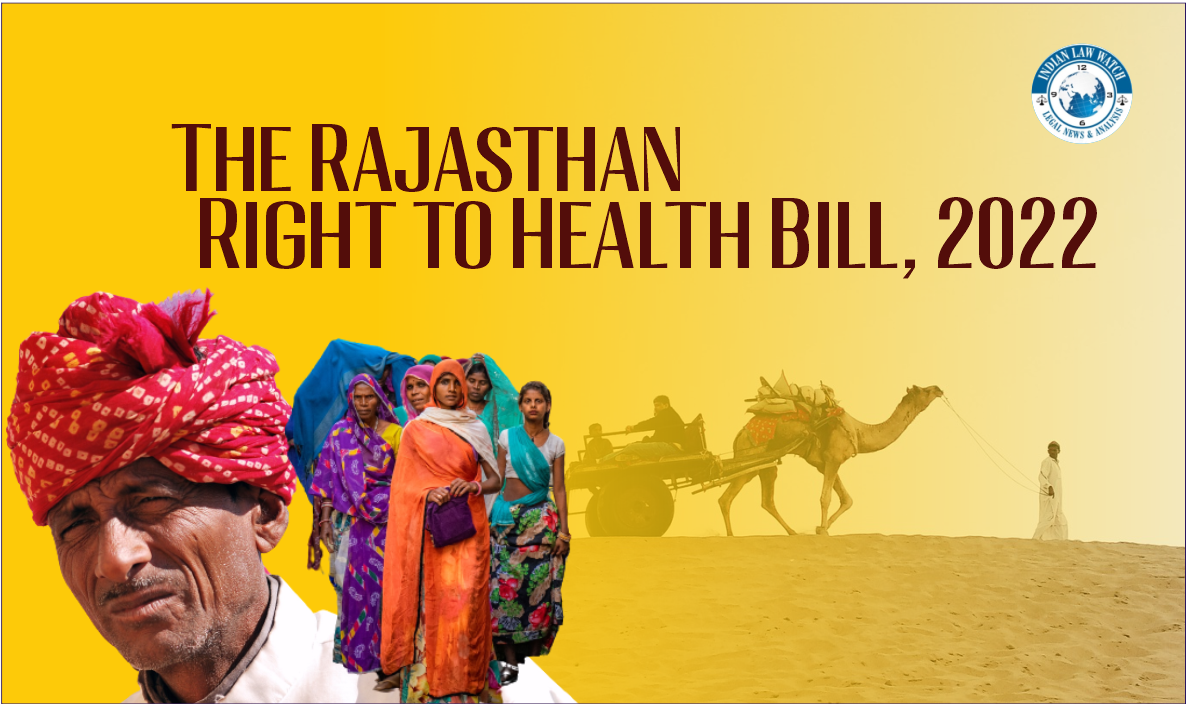

In 1996, the Supreme Court held that the right to life (Article 21) included the right to health within its fold, and also pointed out the obligation of state governments to provide health services.[1] Under the Constitution, public health and sanitation, including hospitals and dispensaries, come under the State List.[2]
In 2018, the National Commission on Human Rights drafted the Charter of Patient Rights to be implemented by state governments.[3] Rajasthan runs certain schemes to ensure health coverage. Under the Mukhyamantri Chiranjeevi Swasthya Bima Yojana, health coverage is provided in over 1,550 private and public hospitals across Rajasthan.[4] Under the yojana, insurance coverage is provided for certain types of treatment.[5]
The Rajasthan Right to Health Bill, 2022, was introduced in the Rajasthan Assembly on September 22, 2022. It seeks to provide for the protection and fulfilment of equitable rights in health and well-being. The Bill has been referred to a Select Committee headed by the Minister of Health and Medical Services, Mr. Parsadi Lal Meena.
The Rajasthan Right to Health Bill, 2022
Key Features
- The Bill provides the right to health and access to healthcare for people in the state. This includes free health care services at any clinical establishment to residents of the state.
- The Bill sets certain obligations on the state government to ensure the right to health and maintain public health.
- Health Authorities will be set up at the state and district level. These bodies will formulate, implement, monitor, and develop mechanisms for quality healthcare and management of public health emergencies.
Key Issues and Analysis
There is no provision for reimbursing private health establishments for providing free healthcare services. This may make these establishments commercially unviable and violate Article 19(1)(g) of the Constitution.
The District Health Authority is required to upload an action taken report on the web portal for complaints. The Bill does not specify who will have access to the report on the web portal. This may infringe on the patient’s right to privacy in medical cases.
Implementing the right to health may increase the financial obligation of the state. The Bill does not provide for such additional costs.


- Right to health: Every person in the state of Rajasthan will have certain rights regarding health. These include the right to: (i) avail free outdoor and indoor patient department services, medicines, and diagnostics in public health institutions, (ii) emergency treatment and care at all health care providers, without any delay waiting for prepayment or police clearance, (iii) receive information about the nature and cause of illness, results, complications and cost of treatment, and access related records, (iv) informed consent before specific tests or treatments, (v) confidentiality and privacy in treatments at all health care establishments, (vi) referral transport, (vii) safe and quality health care, and (viii) grievance redressal.
- Additional rights for residents: Ordinary residents of Rajasthan will have certain additional rights: (i) free health care services from any clinical establishment (as defined under the Clinical Establishment (Registration and Regulation) Act, 2010), and (ii) free transportation, treatment, and insurance coverage against road accidents at all healthcare establishments. The manner for accessing these services will be prescribed under the Rules.
- Obligations of state government: The state government will be required to: (i) formulate and prescribe a public health model, (ii) make appropriate provisions in the state budget, (iii) make available healthcare services with due consideration for distance, geographical area, or population density, (iv) lay down standards for quality and safety at all levels, (vii) set up a coordinating mechanism to ensure adequate supply of safe drinking water, sanitation, and nutritionally sufficient safe food, and (viii) institute measures to prevent, treat, and control epidemics and public health emergencies. In addition, the state government must develop and institutionalise a Human Resource Policy to ensure the equitable distribution of health workers.
- Health Authorities: Independent bodies will be set up at the state and district levels, called the State Health Authority (SHA) and District Health Authority (DHA), respectively. These Authorities will formulate, implement, and monitor mechanisms for quality healthcare and management of public health emergencies. The State Health Authority will be chaired by an Indian Administrative Service officer not below the rank of Joint Secretary, who is appointed by the state government. The district collector will chair the District Health Authority. The State Authority will advise the government on any matter concerning public health.
- Grievance redressal: The Bill provides a mechanism for resolving complaints against denial of services and infringements of rights. A web portal and helpline centre will be established for filing complaints. The concerned officer will have 24 hours to respond to the complaint. The District Health Authority will take up unresolved complaints exceeding the above timeframe. The District Health Authority shall take appropriate action and upload the action taken report on the web portal within 30 days. If the District Health Authority does not resolve the grievance within 30 days, the complaint will be forwarded to the State Health Authority. The State Authority will hear appeals against the District Authority’s decisions.
[1]. Civil Appeal No. 16980-81 of 1996, State of Punjab v. Mohinder Singh Chawla, Supreme Court, 1996.
[2]. Entry 6, List II, State List, Seventh Schedule, The Constitution of India.
[3]. Charter of Patient Rights, Ministry of Health and Family Welfare, 2018.
[4]. “District Wise Empanelled Hospital List”, Mukyamantri Chiranjeevi Swasthya Bima Yojana, Government of Rajasthan, as accessed on February 09, 2023.
[5]. “Purpose of Scheme”, Mukhyamatri Chiranjeevi Swasthya Bima Yojana, Government of Rajasthan, as accessed on January 17, 2023.
Source: PRS Legislative Research (“PRS”)





